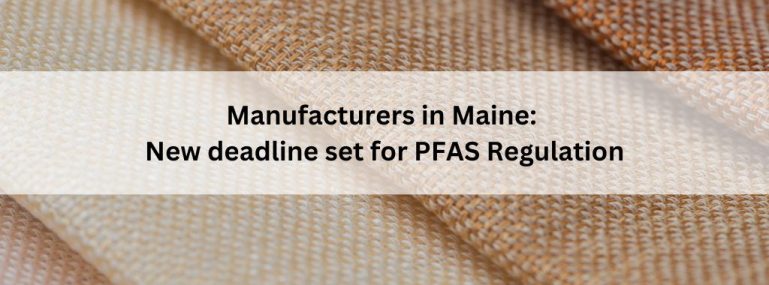Maine has been leading the way in tackling PFAS also known as ‘forever chemicals’ by establishing one of the most restrictive PFAS laws nationwide back in 2021. The governor of Maine signed the new LD 217 on April 16th, 2024, which accelerates the sales ban on certain products. Maine has significantly narrowed down reporting requirements for PFAS product manufactures while delaying the general ban on sale of general products containing PFAS from 2030 to 2032 and identified categories of products exempted from that ban.
The law previously required all manufacturers to report on the PFAS content on the products sold in Maine by 1st January 2025, with a ban on new carpets, rugs and fabric treatments containing intentionally added PFAS and a ban on all products containing intentionally added PFAS by 2030.
New Reporting Requirement:
The information that manufacturers are subject to report to the Maine Department of Environmental Protection (DEP) remains largely unchanged from the original statue, which includes a description of the product, an estimate of the units sold, the purpose of the PFAS in the product, and the amount of each PFAS in the product. PFAS content may be reported as an exact quantity, as the amount of total fluorine, or as falling in a range approved by DEP. The amended statute allows the manufacturer to report the total weight of the product if a manufacturer is unable to provide information regarding the amount of each PFAS in the product. Additionally, the amended statute only requires reporting information “known to or ascertainable by” the manufacturers, a standard borrowed from the federal Toxic Substances Control Act.
Key highlight:
- The deadline for the use of PFAS in products is extended to October 1st, 2032.
- PFAS amount can be reported based on supplier information, not just testing.
- The department is prohibited from providing an exemption for products for which the use of PFAS is currently unavoidable unless the department has adopted the new rules. This prohibition is effective before January 1, 2028.
New Compliance Dates and Product Categories
Starting January 1, 2026, the following products containing intentionally added PFAS will not be permissible for sale in Maine:
- Cleaning products
- Cookware
- Cosmetics
- Dental floss
- Juvenile products (does not include electronic products marketed for use by children under 12 years of age, including computers and handheld devices)
- Menstruation products
- Textile articles (does not include outdoor apparel for severe wet conditions or textile articles included as part of a watercraft, aircraft, or motor vehicle)
- Ski wax
- Upholstered furniture
Starting January 1, 2029, the following products containing intentionally added PFAS will not be permissible for sale in Maine:
- Artificial turf
- Outdoor apparel for severe wet conditions, unless accompanied by a disclosure stating the product contains PFAS.
Starting January 1, 2032, all other products containing intentionally added PFAS will not be permissible for sale in Maine unless DEP determines the use of the PFAS to be currently unavoidable. This ban excludes HVAC and refrigeration equipment, refrigerants, foams, and aerosol propellants – those products will be restricted starting January 1, 2040.
The new law does not apply to certain listed product categories, including:
- Used products and their components.
- Certain firefighting or fire-suppressing foams
- Medical devices, drugs, and biologics regulated by the U.S. Food and Drug Administration
- Veterinary products
- Motor vehicles and aerospace and aviation equipment
- Semiconductors and related equipment and materials for their manufacture
In conclusion, manufacturers dealing with products containing intentionally added PFAS must now adhere to the updated notification requirements set by the Maine Department of Environmental Protection (DEP). This entails providing detailed information about the product and the specific PFAS used, especially for those granted an unavoidable use determination. Staying informed about these regulatory changes is crucial for compliance, and ComplianceXL offers comprehensive consultation and training services to assist companies in navigating these complex requirements.





